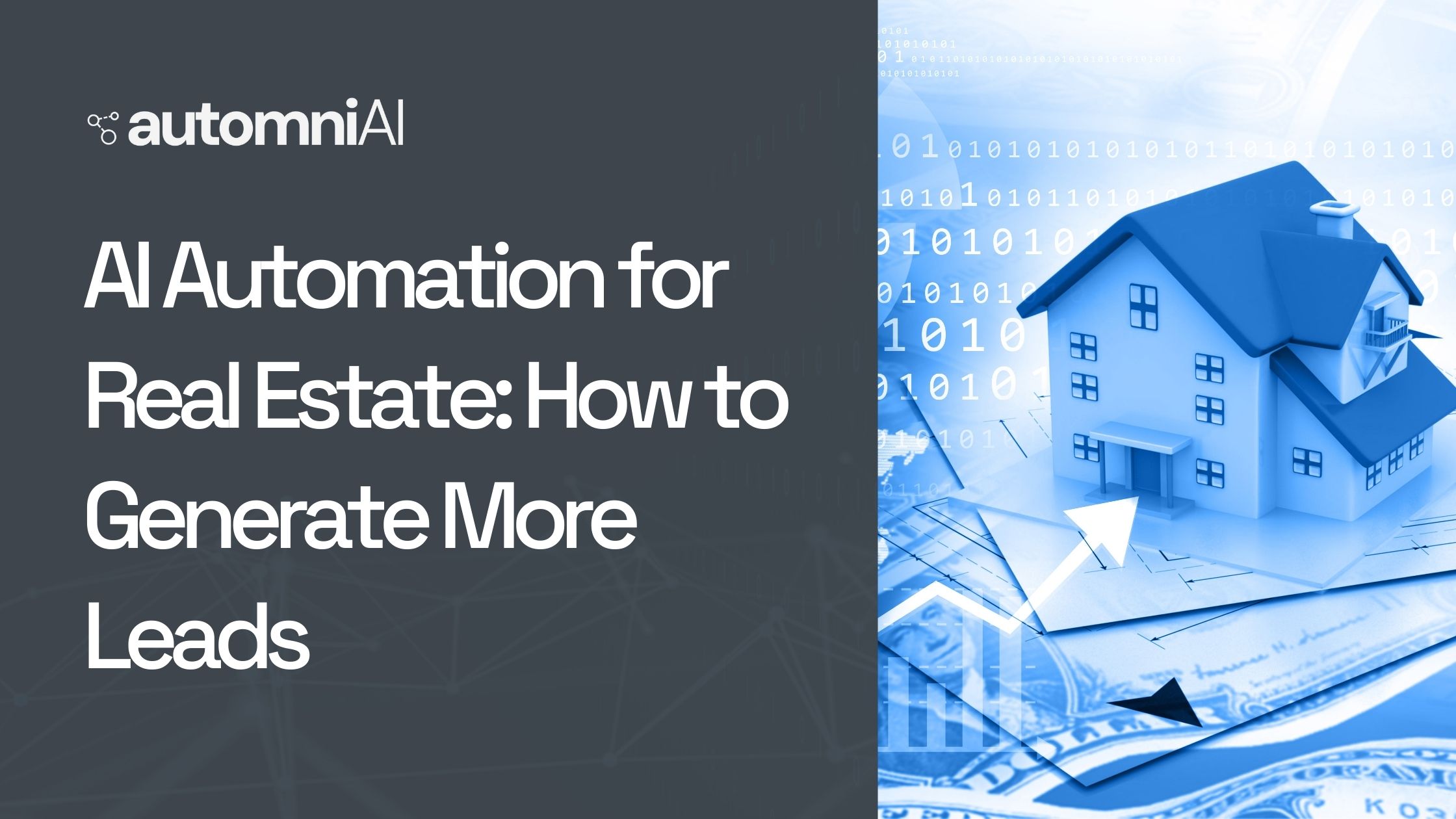In today’s digital world, businesses need more than just traditional marketing to attract and retain…

AI Automation for Real Estate: How to Generate More Leads
Table of Contents
The real estate industry is evolving, and AI automation is playing a huge role in that transformation. Traditionally, lead generation in real estate required heavy manual work—cold calling, door knocking, and countless follow-ups. But with AI, real estate professionals can now automate these processes, making lead generation more efficient and effective.
AI-powered tools help real estate agents analyze market trends, predict customer behavior, and personalize marketing strategies to convert prospects into buyers. From AI chatbots that engage with potential clients in real-time to predictive analytics that identify high-value leads, automation is making real estate marketing smarter and faster.
In this article, we’ll explore how AI is revolutionizing lead generation in real estate, the tools available, and how you can implement AI to boost your real estate business.
Understanding AI in Real Estate
Artificial Intelligence (AI) is a technology that enables machines to learn, analyze data, and make predictions. In real estate, AI is used for:
- Market analysis: AI can scan massive amounts of data to identify market trends and property value fluctuations.
- Customer insights: AI helps in understanding buyer preferences and recommending properties accordingly.
- Automation: From lead management to automated marketing campaigns, AI reduces manual work and improves efficiency.
With AI, real estate agents no longer need to guess which leads are worth pursuing. AI-driven tools provide data-backed insights, ensuring that agents focus on high-quality prospects.
The Role of AI in Lead Generation
AI is changing the game when it comes to lead generation. Here’s how:
Automating Lead Capture and Management
AI tools can capture leads from various sources—website visits, social media ads, and email campaigns—and automatically store them in a CRM system. This ensures no lead goes unnoticed.
AI-Driven Chatbots for Real-Time Engagement
Instead of waiting for an agent to respond, AI chatbots can instantly interact with potential clients. These bots answer FAQs, schedule appointments, and even qualify leads based on their responses.
Predictive Analytics for Targeting Potential Buyers
AI analyzes past buyer behavior and predicts which leads are more likely to convert. This helps agents prioritize leads and personalize their outreach strategies.
AI-Powered Chatbots: Enhancing Customer Interaction
AI chatbots are one of the most effective tools for automating real estate lead generation. These chatbots:
- Provide instant responses to customer queries, reducing response time.
- Qualify leads by asking relevant questions and collecting user data.
- Schedule property viewings and send reminders to clients.
For example, platforms like Drift, ChatGPT-powered bots, and ManyChat are helping real estate agents engage with potential buyers without any manual effort.
Benefits of Using AI Chatbots for Lead Qualification
- 24/7 availability – Never miss a lead, even outside business hours.
- Personalized interactions – AI adapts responses based on user queries.
- Time-saving – Agents focus on serious buyers while chatbots handle initial interactions.
AI-Driven Email Marketing Campaigns
Email marketing is a powerful lead generation tool, and AI makes it even better. AI-driven email campaigns:
- Personalize content based on user behavior.
- Automate follow-ups to nurture leads effectively.
- Optimize subject lines and email copy for higher engagement.
With tools like HubSpot, Mailchimp, and ActiveCampaign, real estate agents can send AI-optimized emails that increase open rates and conversions.
Predictive Analytics for Lead Scoring
One of the biggest challenges in real estate is determining which leads are most likely to convert into clients. This is where predictive analytics comes in. AI uses data from various sources—social media interactions, property searches, past inquiries, and demographic information—to score leads based on their likelihood of purchasing or selling a property.
Understanding Lead Scoring in Real Estate
Lead scoring assigns a value to each prospect based on their actions and behaviors. For example:
- A visitor who frequently checks luxury listings might be classified as a high-intent buyer.
- A user who signed up for a newsletter but never interacted again may be a low-priority lead.
- Someone who clicks on multiple property ads and submits inquiries could be a warm lead worth following up on.
How AI Identifies High-Quality Leads
AI-driven lead scoring works by:
- Analyzing user behavior (search history, page visits, and engagement).
- Comparing past successful transactions to find similar patterns.
- Using machine learning to improve scoring accuracy over time.
For instance, platforms like Zillow Premier Agent and BoomTown use AI to rank leads, allowing real estate agents to focus on the most promising ones.
Case Studies of AI-Powered Lead Scoring
Real estate firms leveraging AI-powered lead scoring have seen higher conversion rates and better client engagement. By focusing on pre-qualified leads, agents spend less time on cold calls and more time closing deals.
Virtual Assistants for Real Estate Agents
AI-powered virtual assistants (VAs) are another game-changer in real estate automation. These AI-driven tools help real estate professionals manage schedules, handle inquiries, and automate administrative tasks.
AI Tools for Scheduling and Client Communication
Some popular AI virtual assistants include:
- Amy by X.AI – An AI assistant that schedules meetings and appointments.
- Reva by Real Estate Webmasters – A virtual assistant designed specifically for real estate agents.
- Conversica – An AI sales assistant that engages leads through automated conversations.
Reducing Workload Through Automation
AI VAs can:
- Respond to client queries instantly.
- Schedule property viewings without agent intervention.
- Send automated follow-ups and reminders to potential buyers.
With AI handling repetitive tasks, real estate agents can focus on building relationships and closing deals instead of managing admin work.
AI and Social Media Marketing
Social media is a goldmine for real estate leads, and AI is making it easier to attract and convert potential clients.
How AI Improves Ad Targeting
AI-driven tools analyze user interactions and preferences to deliver hyper-targeted real estate ads. Platforms like Facebook, Instagram, and LinkedIn use AI to:
- Identify users interested in buying or selling homes.
- Optimize ad placements for maximum engagement.
- Automate retargeting campaigns for potential buyers.
AI-Generated Content for Social Media
AI-powered tools like Copy.ai, Jasper, and ChatGPT can create engaging property descriptions, blog posts, and social media content in seconds. This helps real estate agents maintain an active online presence without spending hours on content creation.
Monitoring Engagement and Optimizing Campaigns
AI-driven analytics tools track social media engagement and provide insights into:
- Which posts generate the most leads.
- What type of content resonates with your audience.
- The best times to post for maximum reach.
By leveraging AI for social media marketing, real estate agents can grow their online presence, attract more leads, and boost conversions effortlessly.
AI-Powered CRM Systems
A Customer Relationship Management (CRM) system is crucial for real estate professionals, and AI-powered CRMs take efficiency to the next level.
How AI Integrates with CRM for Better Lead Management
AI-powered CRMs like Salesforce, HubSpot, and Zoho CRM help agents:
- Automate data entry and lead tracking.
- Provide real-time insights into client behavior.
- Predict the best time to follow up with leads.
Automating Follow-Ups and Nurturing Leads
AI-driven CRMs can send personalized emails, reminders, and messages to nurture leads without manual effort. This keeps prospects engaged and increases the chances of conversion.
Best AI CRM Tools for Real Estate Professionals
Some top AI-powered CRMs include:
- Follow Up Boss – Automates lead follow-ups and appointment scheduling.
- LionDesk – AI-driven CRM with built-in text and email automation.
- CINC (Commissions Inc.) – A lead management system that prioritizes high-intent buyers.
With AI-enhanced CRMs, real estate agents can streamline their workflow, improve client communication, and close more deals faster.
AI in Property Listings and Recommendations
AI is transforming property listings by enhancing recommendations and optimizing listing descriptions.
How AI Personalizes Property Recommendations
AI analyzes user behavior to suggest the most relevant properties based on:
- Search history and saved listings.
- Budget and location preferences.
- Market trends and buyer patterns.
For example, Zillow and Redfin use AI to personalize property suggestions, improving user experience and increasing engagement.
Enhancing Property Listings with AI-Generated Descriptions
AI-powered tools like Listing AI and ChatGPT can automatically generate compelling property descriptions. These AI-written listings:
- Highlight key property features.
- Use persuasive language to attract buyers.
- Improve SEO rankings for real estate websites.
Virtual Tours and AI-Enhanced Property Images
AI-driven technologies like Matterport and EyeSpy360 create 3D virtual tours and enhance property images, allowing buyers to explore homes remotely. This improves engagement and boosts conversions.
AI-Driven SEO Strategies for Real Estate Websites
SEO (Search Engine Optimization) is crucial for real estate agents looking to generate organic leads online. AI makes SEO faster, smarter, and more effective.
AI Tools for Keyword Research and Content Optimization
AI-driven SEO tools like SurferSEO, Clearscope, and SEMrush help real estate websites:
- Identify high-ranking keywords.
- Optimize content for better search engine visibility.
- Analyze competitors’ SEO strategies.
AI-Driven Blog Writing for Real Estate Marketing
AI-generated blogs provide:
- Engaging real estate insights to attract visitors.
- Local market updates to establish authority.
- Evergreen content to improve long-term website rankings.
Enhancing Website Rankings with AI-Powered Insights
AI-powered analytics tools provide real-time SEO performance tracking, ensuring that your website consistently ranks high on Google.
AI and Voice Search Optimization
With the rise of voice assistants like Alexa, Siri, and Google Assistant, optimizing for voice search is more important than ever.
The Rise of Voice Search in Real Estate
Buyers now use voice search to:
- Find nearby real estate agents.
- Search for homes based on location.
- Get instant answers to real estate questions.
How AI Optimizes Content for Voice Search
AI-powered SEO tools suggest:
- Conversational keywords that match natural speech patterns.
- Question-based content to align with how people ask queries.
- Mobile-friendly website designs for better user experience.
Examples of Voice Search AI Tools
Some popular AI tools for voice search optimization include:
- AnswerThePublic – Helps identify common real estate questions.
- Google’s Natural Language Processing API – Optimizes content for conversational search.
AI for Real Estate Investment Decisions
AI is not just beneficial for lead generation; it also plays a crucial role in real estate investment decisions. By analyzing market trends, property values, and economic conditions, AI helps investors make data-driven investment choices.
AI-Driven Market Analysis for Better Investment Choices
AI can scan millions of real estate records to provide insights on:
- Neighborhood growth trends.
- Historical property values.
- Demand and supply fluctuations.
For example, platforms like Mashvisor and HouseCanary use AI to offer real-time data for investors, helping them identify profitable investment opportunities.
How AI Predicts Property Value Fluctuations
AI uses predictive analytics to forecast property values based on:
- Interest rates and mortgage trends.
- Local economic growth and job market conditions.
- Historical property appreciation rates.
This helps investors determine whether it’s the right time to buy or sell properties.
Risk Assessment Using AI Algorithms
AI-powered risk assessment tools analyze market stability, rental demand, and property condition to minimize investment risks. Zillow Zestimate is an example of how AI can predict property values and investment potential.
By leveraging AI for investment decisions, real estate professionals can maximize ROI and reduce financial risks.
Challenges of Implementing AI in Real Estate
While AI offers numerous advantages, its implementation in real estate comes with some challenges.
Cost and Technical Challenges
- Expensive AI tools – High-end AI solutions require a significant investment.
- Integration issues – Traditional real estate firms may struggle to integrate AI with their existing systems.
- Data privacy concerns – Handling large amounts of sensitive customer data requires strict security measures.
Resistance from Traditional Real Estate Professionals
Many real estate professionals hesitate to adopt AI due to:
- Fear of job displacement.
- Lack of technical knowledge.
- Preference for traditional marketing and sales methods.
How to Overcome AI Adoption Barriers
To successfully implement AI in real estate, professionals should:
- Invest in AI training for agents and staff.
- Start with simple AI tools before upgrading to advanced solutions.
- Ensure compliance with data protection regulations to build trust with clients.
By overcoming these challenges, real estate businesses can fully benefit from AI automation and improve lead generation.
Conclusion & Future of AI in Real Estate
AI automation is transforming real estate lead generation by improving efficiency, targeting the right audience, and enhancing customer engagement. From AI chatbots and predictive analytics to virtual assistants and CRM automation, AI is helping real estate professionals generate more leads with less effort.
The Future of AI-Driven Real Estate Marketing
Looking ahead, AI will continue to evolve in real estate through:
- Smarter AI chatbots with advanced natural language processing.
- More accurate predictive analytics for real estate trends.
- Increased use of virtual reality (VR) and AI-powered 3D home tours.
Final Thoughts on Adopting AI for Real Estate Success
Real estate professionals who embrace AI will stay ahead of the competition and close more deals faster. While challenges exist, the benefits of AI-driven automation far outweigh the drawbacks.
If you’re in the real estate business and want to generate more leads effortlessly, it’s time to integrate AI-powered tools into your marketing and sales strategy.
FAQs
1. How does AI help real estate agents generate leads?
AI automates lead capture, scoring, and follow-ups using tools like chatbots, predictive analytics, and CRM automation. This ensures agents focus on high-quality leads and close deals faster.
2. What are the best AI tools for real estate automation?
Some of the best AI tools for real estate include:
- AI-powered CRMs (HubSpot, LionDesk, Follow Up Boss).
- Chatbots (Drift, ManyChat, Real Estate Webmasters’ Reva).
- Predictive analytics (BoomTown, Zillow Premier Agent, HouseCanary).
3. Can AI replace real estate agents?
No, AI enhances real estate processes but cannot replace human agents. AI handles repetitive tasks, while agents focus on relationship-building and closing deals.
4. How much does AI automation cost for real estate businesses?
AI tool costs vary based on features and complexity. Basic AI chatbots may cost $50-$100 per month, while advanced AI-powered CRMs and predictive analytics tools can range from $500 to $5,000 annually.
5. What are the risks of using AI in real estate?
The main risks include:
- Data privacy concerns due to sensitive client information.
- Dependence on technology, which may lead to reduced human interaction.
- Implementation challenges if not integrated properly into existing workflows.
By addressing these risks, real estate professionals can maximize AI’s potential and enhance lead generation effortlessly.




Comments (0)